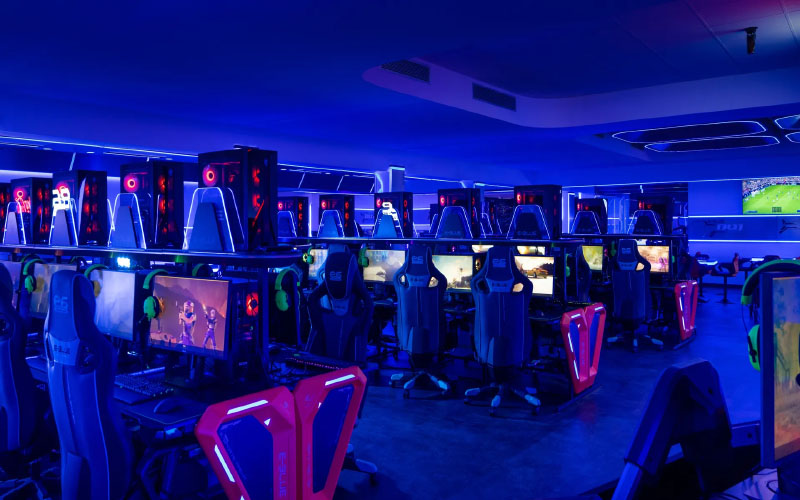
Explore: The Esports Gaming Center Making Waves
The rise of competitive gaming, known as esports, has transformed the landscape of entertainment and recreation, making the concept of an esports gaming center a vital part of this vibrant ecosystem. These centers are not merely places to play video games; they are hubs for community interaction, skill development, and competition. As we delve into the fascinating world of esports gaming centers, we will explore their history, importance, services, experiences, benefits, and the future they hold for gaming enthusiasts.
Introduction to the Esports Gaming Center
Esports has evolved from a niche hobby to a global phenomenon, captivating millions worldwide. This explosion in popularity has led to the emergence of dedicated facilities, known as esports gaming centers, which cater to both casual and professional gamers. These centers provide a platform that encourages participation, collaboration, and growth within the gaming community.
As technology continues to advance and games grow in complexity and competitiveness, the role of the esports gaming center, such as OKVIP, becomes increasingly significant. They serve not only as venues for gameplay but also as community gathering spots, educational resources, and career launchpads for aspiring esports professionals.
History and development of Esports Gaming Center
The history of esports dates back several decades. It began with simple arcade games in the 1970s, where players would compete for high scores on machines. Over the years, tournaments started gaining traction, notably with titles like “Space Invaders” and later “Street Fighter,” paving the way for organized competitive gaming.
The real turning point came in the late 1990s and early 2000s when internet speeds increased and online gaming became more accessible. Games like “StarCraft,” “Quake,” and “Counter-Strike” garnered massive followings, leading to the establishment of leagues and tournaments. With platforms like Twitch launching in 2011, streaming gameplay became mainstream, allowing fans to engage with competitors directly.
The esports industry exploded in the 2010s, with multi-million dollar prize pools and sponsorship deals injecting capital into the ecosystem. Major game publishers recognized the potential of crafting engaging, competitive environments and began to support esports initiatives actively. By the end of the decade, esports had become a billion-dollar industry, prompting the creation of specialized venues and esports gaming centers designed to house events and foster local talent.
The importance of gaming centers in the community
Esports gaming centers play a crucial role in building a sense of community among gamers. Unlike solo gaming at home, these centers provide a shared environment where players can come together, forming friendships and rivalries alike. The social aspect of gaming often gets overlooked, yet it is a fundamental element of the experience.
These centers also empower local talent by providing access to resources that may be otherwise unavailable. From high-quality hardware to reliable internet connections, they eliminate barriers that could prevent aspiring gamers from honing their skills. Many esports gaming centers host training sessions, workshops, and seminars to educate gamers about teamwork, strategy, and sportsmanship, thereby nurturing the next generation of esports athletes.
In addition to fostering camaraderie, esports gaming centers can have broader implications for the community. They can serve as safe spaces for individuals who might feel isolated or marginalized, promoting inclusivity and diversity in gaming. Local charities and schools often partner with these centers, organizing events that encourage cooperation, responsibility, and respect within the gaming community.
Services offered by the center
An esports gaming center provides an array of services tailored to different skill levels and interests. First and foremost, they offer access to high-performance gaming equipment, including powerful PCs, consoles, and peripherals, ensuring that players have the tools they need to excel.
Beyond infrastructure, many gaming centers organize regular events such as tournaments and casual gaming nights, catering to all types of gamers. These events foster friendly competition while allowing players to showcase their skills and learn from one another. For those who aspire to go pro, some centers even offer coaching services, connecting them with experienced players who can provide guidance and mentorship.
Furthermore, the community aspect cannot be overstated. Many esports gaming centers cultivate an atmosphere that encourages collaboration rather than competition, facilitating direct communication between players. This culture helps bridge gaps across various demographics, allowing individuals from different backgrounds to connect over their shared passion for gaming.
In essence, esports gaming centers position themselves as multifaceted enterprises, serving not just as places to play games but as holistic environments for growth, learning, and connection.
Conclusion
In conclusion, esports gaming centers are revolutionizing the way people experience gaming. They embody the evolution of competitive gaming, transforming it into a communal venture that promotes social interaction, skill development, and personal growth. As the esports industry continues to expand, these centers will undoubtedly remain pivotal to the thriving gaming community.